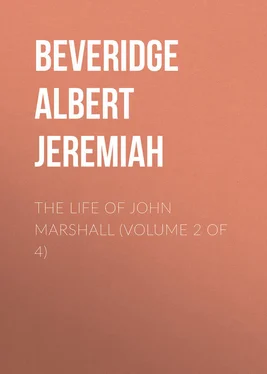The enterprise appears not to have filled the public with investing enthusiasm and no subscriptions to it were received.
See infra , chap. x.
Marshall to James M. Marshall, April 3, 1799; MS. This was the only one of Marshall's sisters then unmarried. She was twenty years of age at this time and married Major George Keith Taylor within a few months. He was a man of unusual ability and high character and became very successful in his profession. In 1801 he was appointed by President Adams, United States Judge for a Virginia district. (See infra , chap. xii.) The union of Mr. Taylor and Jane Marshall turned out to be very happy indeed. (Paxton, 77.)
Compare this letter of Marshall with that of Washington to his niece, in which he gives extensive advice on the subject of love and marriage. (Washington to Eleanor Parke Custis, Jan. 16, 1795; Writings : Ford, xiii, 29-32.)
Marshall to Everett, July 22, 1833.
Christian, 28.
Richmond and Manchester Advertiser , Sept. 24, 1795.
Proceedings of the M. W. Grand Lodge of Ancient York Masons of the State of Virginia, from 1778 to 1822, by John Dove, i, 144; see also 121, 139.
See infra , chap. x.
See vol. i, chap. v, of this work.
Gilmer, 23-24.
Gustavus Schmidt, in Louisiana Law Journal (1841), 81-82.
For a list of cases argued by Marshall and reported in Call and Washington, with title of case, date, volume, and page, see Appendix I.
A good illustration of a brilliant display of legal learning by associate and opposing counsel, and Marshall's distaste for authorities when he could do without them, is the curious and interesting case of Coleman vs. Dick and Pat, decided in 1793, and reported in 1 Washington, 233. Wickham for appellant and Campbell for appellee cited ancient laws and treaties as far back as 1662. Marshall cited no authority whatever.
See Stevens vs. Taliaferro, Adm'r, 1 Washington, 155, Spring Term, 1793.
Johnson vs. Bourn, 1 Washington, 187, Spring Term, 1793.
Ib.
Marshall to Archibald Stuart, March 27, 1794; MS., Va. Hist. Soc.
Ib. , May 28, 1794.
Munford, 326-38.
See vol. iii of this work.
Constitution of the United States, article vi.
Ib. , article iii, section 2.
The Fairfax deal; see infra , 203 et seq.
Henry, ii, 475.
Howe, 221-22.
3 Dallas, 256-57, and footnote. In his opinion Justice Iredell decided for the debtors. When the Supreme Court of the United States, of which he was a member, reversed him in Philadelphia, the following year, Justice Iredell, pursuant to a practice then existing, and on the advice of his brother justices, placed his original opinion on record along with those of Justices Chase, Paterson, Wilson, and Cushing, each of whom delivered separate opinions in favor of the British creditors.












